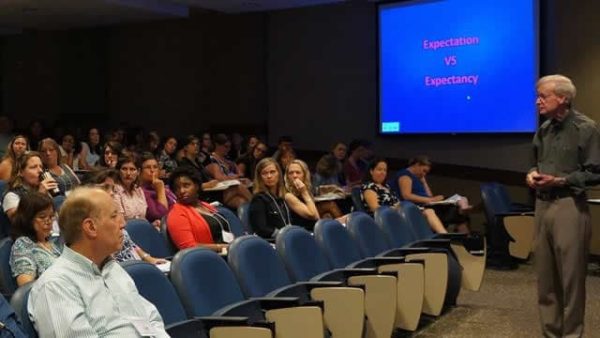Play therapy program ‘poised for growth’ says expert at University conference

Counselors, therapists and scholars from across North Carolina recently traveled to UNC Charlotte for a conference on play therapy featuring the leading expert in the field.
The College of Education’s Multicultural Play Therapy Center hosted the five-day workshop. It featured discussions on the underlying theory of play therapy and provided practical tips for employing the technique, which allows young children to explore and deal with issues by expressing themselves through play in a controlled environment.
Gerry Landreth, founder of the Center for Play Therapy at the University of North Texas, is widely recognized as the field’s foremost expert. He was a featured speaker during the conference. He said play therapy is effective because it fits children’s developmental needs.
“Children are not verbal creatures. They don’t have the language to express themselves. Toys are like their words and play is like their language. So we give them a play setting with carefully selected toys to express themselves and unconsciously the human organism is motivated to use a natural medium of expression to reveal what’s going on inside.”
This ninth annual conference, which drew record numbers throughout the week, including more than 150 on Monday, is representative of UNC Charlotte’s rising influence in the field, according to Landreth.
“The program is poised for growth. It could soon become the largest play therapy center between Texas and the east coast,” he said.
Phyllis Post is director of the University’s Multicultural Play Therapy Center and the program’s architect. She said the most rewarding part of the conference is interacting with attendees.
“It is great hearing how much they enjoy the presentations and love coming to UNC Charlotte for the conference. I love having professionals in the community come to see our campus.”
Joanna Zahra, a therapist with Charlotte’s Alexander Youth Network, said having access to nearby professional development is helpful.
“As a provider it can be very challenging finding trainings amidst a hectic schedule,” said Zahra. “Knowing you can count on a local school to provide quality presenters on such a beneficial therapy technique for kids is really great.”
Adrian Thornburg is a support counselor at the Levine Cancer Institute and a UNC Charlotte alumna. She said the program’s focus on diversity sets it apart.
“Our world is so diverse and the work of counselors must move with that diversity to gain understanding from other points of view and cultures we serve now and in the future. “
This month’s conference looked to “broaden and deepen” practitioners’ play therapy skills, something Landreth tried to do by making his presentations interactive and free flowing.
Personal interaction is central play therapy. Landreth reminded participants that the technique is not about “fixing” a child’s problems; it’s about developing relationships.
“It is the therapy, it’s the relationship through which the child learns about the self, learns about bringing the self under control, about being more creative. A relationship in which the child feels safe enough to play out whatever scary stuff they have experienced, whatever abuse, whatever it is,” he said.
Zahra, the local children’s therapist, agreed. She said the technique works because it returns to the “golden rule” of therapy: start where the client is at.
“For a child, there is no better way to express where you are emotionally then play and no better way to explore your thoughts than with someone who is consistently there to be your support through providing that freedom of expression.”
UNC Charlotte’s program is one of 29 nationally approved by the Association for Play Therapy. The College of Education offers annual courses on the topic, and students interested in an in-depth program of study can earn a graduate certificate in play therapy.